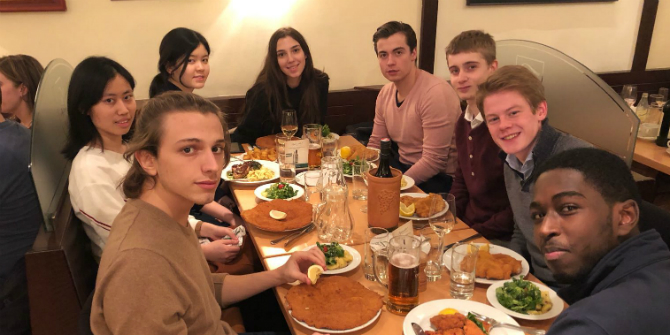We’re still in the middle of the academic year and exams are around the corner, but for prospective students planning to start a master’s degree next year, it is never too early to start thinking about which courses you plan to take. Choosing courses can be anxiety-inducing or overwhelming, especially for international students unfamiliar with the British academic system. As an international student myself, I found this whole process sometimes difficult to navigate. To make it easier for incoming students, here’s five useful tips to think about when choosing your master’s courses next year.
1. Ask yourself what you would like to get out of your degree
Students come to LSE to pursue master’s degrees for a variety of reasons. They might be looking to specialise their knowledge and hone their skills in a particular subject area, or they might be transitioning to a new academic subject. What you want to get out of your master’s degree will likely influence which courses you consider, so it is important to have an idea of what you desire so that you can make better-educated course choices.
2. General vs. specialized courses
Most LSE degree programmes offer a wide diversity of courses. For example, in my home department of international history, you can take courses on crisis decision-making, nuclear weapons and the arms race, European integration, or the Cold War in Latin America. Beyond subject diversity, courses usually either offer either breadth or depth in content. If you’re looking for introductions to subject areas, consider courses that offer a range of content. If you already have background in a topic, aim for a course that allows you to delve deeper into those issues. In my own experience, I chose a selection of both. One of the great things about LSE is the ability to pick from a wide array of interesting courses. Some departments allow you to take one course outside of your department, so that is something to keep in mind if a different department offers a complementary course to round out your schedule.
3. Read the course descriptions
This sounds like it is obvious or self-explanatory, but you would be surprised how many students don’t do this and only look at the course titles. The course title can only tell you so much, so it is vital to read the course description to ensure it covers content you are actually interested in. I know several students who committed this error and then got stuck in courses they discovered they were not interested in after the deadline passed for changing courses. Most master’s degree programmes are only a year long, so do your research to make sure it counts.
4. Check out the assignments
Some LSE courses are 100% exam while others require you to write a series of papers to determine your mark. In the course description, it will tell you what the requirements are for each course. Every student has assignment preferences, and while this shouldn’t be a decisive factor in your selections, it is good to keep them in mind. If you are not comfortable with one of your course marks being decided by one test, you can find others that allow for a series of assignments and more flexibility.
5. Half vs. full-year courses
In my home department, nearly every course offered is a full-year course. In other departments, it is the opposite. Some have a mixture of both. If you think you might want to switch things up after Michaelmas Term, consider taking two half-year courses so you can get more out of your experience. Starting a new course in Lent term can be a welcome change of pace and give you the opportunity to learn about new ideas or subjects. If your department gives you this opportunity, you should take it.
While these tips are not comprehensive, I hope they are helpful when you choose your courses next year. Course selection can be daunting or stressful, so keep these tips in mind when making your choices and they can help ensure a more manageable process!





